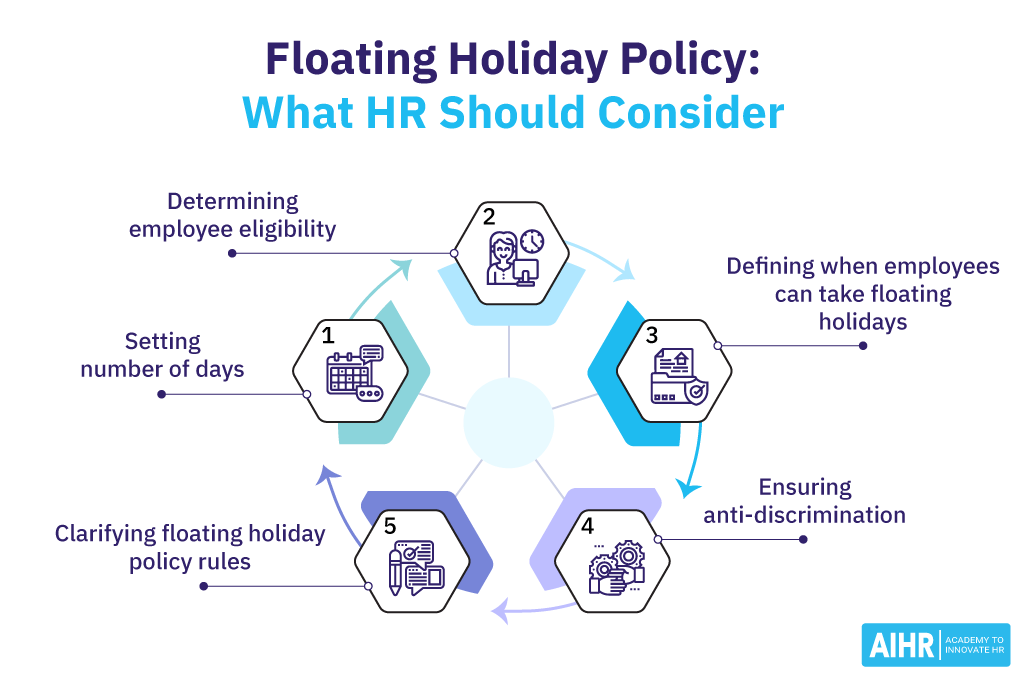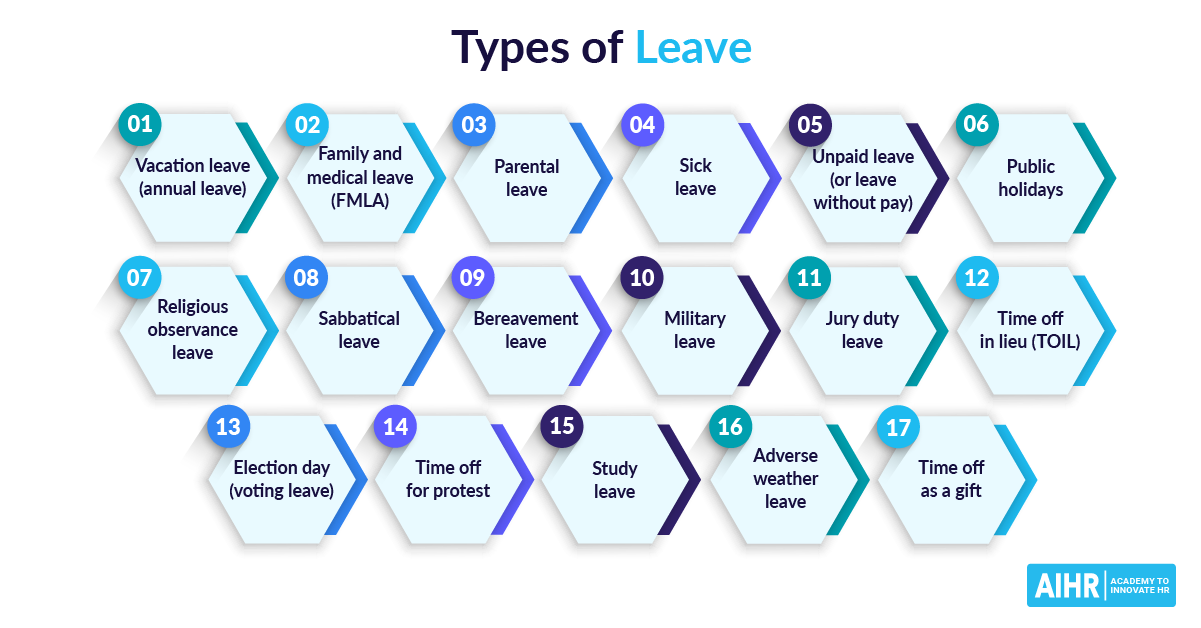Floating Holiday
What is a floating holiday?
A floating holiday is a flexible paid leave option, allowing employees to choose a day off that aligns with their personal, cultural, or religious needs, independent of the standard holiday calendar. Employers usually offer one to two days of floating holidays per year.
This adaptable time off is distinct from traditional vacation or sick leave, offering a tailored approach to work-life balance and inclusivity in the workplace. It empowers employees to observe significant days of their choosing, reflecting an organization’s commitment to diversity and employee well-being.
Floating holiday examples
Here are two examples of how floating holidays can look like in practice:
- Cultural observance: An employee, who practices a religion not widely observed in their region, opts to use a floating holiday to commemorate a significant religious festival, such as Diwali or Yom Kippur. This allows the employee to participate in cultural rituals and family gatherings, respecting their religious obligations without impacting their standard vacation or sick leave.
- Personal milestone: Another employee chooses to use a floating holiday for a personal reason, such as celebrating a significant family event like a child’s graduation ceremony. This flexibility acknowledges the importance of personal life events without dipping into their regular vacation days.
Floating holiday vs. PTO
Although floating holidays and paid time off (PTO) are paid leaves, they differ in how they’re used. PTO can be used for planned vacations, unexpected illnesses, or personal matters, while a floating holiday can be used for:
- Observing a specific cultural or national holiday a company doesn’t observe: For example, a company that doesn’t observe Christmas or Easter can include that day on their list of floating days for employees who observe them to take.
- Any reason an employee chooses to take time off during the year: For example, to pick up a family member arriving in the country from the airport.
PTO policies are generally standardized within a company, offering a set amount of days off that employees can use at their discretion. The administration of PTO is often straightforward, with clear guidelines on accrual, usage, and carryover.
Floating holiday policies can vary more significantly from one organization to another. They require careful administration to ensure fairness and inclusivity, particularly in recognizing diverse cultural and religious observances. The policy may also include specific guidelines on how and when these days can be used and how they interact with other types of leave.
In many countries, employers must provide PTO. On the other hand, floating holidays aren’t required by law and are usually considered a benefit or a perk.
Typically, employees must exhaust their floating holidays within a calendar year or lose them, whereas PTO carries over to the next year.
Floating holidays versus vacation days
Organizations offer vacation days as part of an employee reward system for specific milestones, such as two weeks’ holiday for six months of working. On the other hand, floating holidays aren’t earned but given for a particular holiday or any reason an employee wants.
Benefits of floating holidays
There are several ways that companies can benefit from offering floating holidays to their employees. These include:
- Improved productivity: A floating holiday benefit is an additional way for employees to balance their work and life duties, which helps increase their productivity.
- Supporting diversity and inclusion: Floating holidays show that a company values its employees’ diverse cultural backgrounds enough to give them time off work to commemorate or celebrate their special holidays.
- Preserving employees’ PTO: Employees can use floating holidays to address their pressing personal needs without using their vacation time, which helps them maximize vacation time.
- Boosting team morale: Employees may feel demoralized when they have to work on standard holidays due to strict deadlines and rigorous schedules. Floating holidays boost employee morale by allowing them to take time off later when they work during a holiday.
Disadvantages of floating holidays
Implementing floating holidays brings significant benefits to a company. However, some negative consequences can also arise if policies are not adequately put in place.
Examples of downsides floating holidays can bring include:
- Scheduling mishaps: Employees might schedule their floating holidays on busy days, creating a shortage of workers when they’re most needed.
- Dissatisfaction among employees: Some employees might feel unsatisfied that the details of their holiday haven’t been well-captured.
- Paying for unused floating holiday time: Companies might pay for the unused floating holiday when an employee leaves under certain circumstances due to specific laws that mandate them to do so.
How to create a floating holiday policy
When offering floating holidays as a perk to employees, HR must take the proper steps to ensure the floating holiday policy is effective across the entire organization. These essential steps include:
1. Setting a specific number of floating holidays in a calendar year
How many floating holidays will employees receive each year? Set a maximum number of floating days redeemable during a calendar year.
You can pro-rate the days. For example, employees hired during the first quarter can have more floating holidays available than those employed in the last quarter.
2. Determining the employee eligibility for floating holidays
Have an eligibility criterion that clearly states who qualifies for floating holidays, whether part-time, full-time, or both sets of employees. The requirements should also outline the period new hires must wait to be eligible for floating holidays.

3. Defining when employees can take floating holidays and how to request them
The next step is to consider when employees can take their floating holidays. It can be on specific days like religious, cultural, or any other federal holiday. Alternatively, it can be on any day an employee wishes to take without restriction.
Your policy should also address how far in advance employees should request a floating holiday and if they need manager approval.
HR tip:
Consider tracking floating holiday requests in your leave management system.
4. Ensuring anti-discrimination rules are not violated
Ensure the company’s floating structure is inclusive and fair to all employees from all religious and cultural backgrounds. Floating holiday benefits should never be better for one group than the other to promote equality.
5. Clarifying floating holiday policy rules
Establish specific requirements for unused floating holidays and if and how employees can monetize outstanding floating holidays yearly. In addition, clarify the rules of floating vacation pay at the time of an employee’s departure or termination.
A floating holiday is becoming a way to compete for talent and show your organization’s commitment to Diversity, Equity, Inclusion and Belonging.
Employers offering floating holidays on top of the regular paid time off can attract and retain the best employees plus keep them productive. To implement a successful floating policy, organizations should ensure equity and transparency in their policy structures.
FAQ
A floating holiday is paid time off that employees can schedule at their discretion, typically to observe personal, cultural, or religious events not covered by standard company PTO policies. Companies typically offer one to two days of floating holidays annually. Unlike PTO, floating holidays usually do not carry over to the next year.
A floating holiday is a specific, flexible day off for personal or cultural reasons, distinct from Paid Time Off (PTO), which is a more general accumulation of leave for various purposes like vacation, sickness, or personal matters.
Employers are not typically required to pay out unused floating holidays, as these are discretionary benefits. Floating holiday policies vary by organization and jurisdiction.
As a floating holiday is a type of paid time off, floating holiday pay refers to the regular wages an employee receives for a floating holiday.







